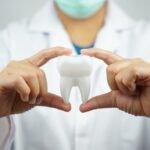Fear of the dentist is much more common than you might think. All over the world, 75% of people have this fear, You are not alone. Often, the fear is so intense that people avoid going to the dentist, which can lead to more serious oral health problems. Odontophobia can be caused by many factors, including bad experiences in the past, irrational fears, overwhelming feelings of panting, butterflies in the stomach, and excessive sweating or even an oversensitivity to pain, Other factors that contribute to Odontophobia. Don't you like going to the dentist? Fortunately, there are ways to deal with the fear of the dentist and overcome this problem. We separate 6 precious tips that will help you a lot at this time
A lot of people think it's freshness, but the truth is that it's far from being. According to the literature, Fear is a natural emotion that prepares us to deal with threats, leading us into fight-or-flight situations. A phobia is a persistent, unrealistic and intense fear of a specific stimulus, leading to a complete avoidance of the perceived danger. Understanding this, we can say that Fear of dentists is a specific reaction to threatening stimuli in dental treatments.. And the combination of fear and phobia is what defines Odontophobia, which, as previously mentioned, is very common because you relate dental treatments to pain and discomfort.
Some Other Factors That May Contribute to Odontophobia, or Fear of the Dentist
O fear of the dentist can also arise from a bad interaction with the professional and the way his attitude was perceived by you. For example, in situations where the dentist was cold or indifferent during the service or even because of the fear of not being understood. This experience can result in a increase in your fear, and this is completely understandable. Bad experiences in childhood, fear of pain, memories of complications from procedures and/or painful procedures, can also be included in this list as a determining factor for you to have odontophobia and/or dental anxiety
Doctors and Hospitals can also awaken Odontophobia
- Odontophobia can also occur if the person has traumatic experiences with doctors in general. Some people may have their fear triggered just by seeing a doctor of any kind, smelling smells associated with hospitals, or being afraid of people considered to be in a position of power. One of the probable explanations for Odontophobia is that, traditionally, the methods used were quite uncomfortable and the treatments were synonymous with pain. This trauma may even have been passed on from parents to children and younger people, but with the advancement of science and technology, dental procedures have become increasingly safe and comfortable.
What do I need to do to treat odontophobia and overcome fear of the dentist?
- Odontophobia is therefore not an inevitable condition and can be successfully treated, don't worry, there are many things we can do to help you overcome your fear of the dentist. The first thing is to understand the Why are some people afraid of the dentist? and understand what is causing your fear. This will help you deal with it more effectively. Understand here how sedation works at the dentist.
- You who are reading this article, looking for a solution, must be thinking that your fear of the dentist starts with the thought of having to go to the appointment, and that is why your case must be more serious. No, none of this I will explain to you here about dental anxiety.
Is dental anxiety that feeling I feel just thinking about dental treatment, or that fear of feeling pain and having to go to the dentist?
- Yes, dental anxiety so we can call it, is an emotional state that precedes the actual encounter with threatening stimuli, which sometimes is not even identifiable. It is a feeling that precedes going to the dentist, and can be observed already during the need for care, and later in carrying out the exams, in making decisions when looking for a dentist and in other circumstances prior to the actual care. Fear and anxiety about the dentist and dental treatment are significant features that contribute to you avoiding dental care, and we can describe as the fifth most common cause of anxiety, that's right, this feeling is more common than you think.
Patients with dental anxiety feel that something terrible is going to happen during treatment and therefore prefer not to make appointments, However, fear of the dentist can complicate your oral health
- Anxiety shouldn't stop you from getting the quality dental care you deserve. If the thought of going to the dentist makes you fearful or anxious, sedation dentistry can help you get the care you need for long-lasting oral health.
Why Are Some People Afraid of the Dentist?
- People are afraid of the dentist mainly due to having had some negative experience during dental treatments in the past. At least half of the people who report this fear, mention the beginning in childhood, through punitive behaviors, or else this could be linked to poor care received in other stages of life, the pain experienced or the feeling of fear they had. Also, if you know someone who has had a similar experience, this could also influence their opinion on this topic. Another factor that can also interfere is your level of anxiety. The bigger it is, the more difficult it will be to deal with the situation. In summary, a person may be afraid of the dentist for one or all of these reasons, or even an interaction between them.
Procedures that have an influence on fear of the dentist
- Procedures involving a needle or drill also have a great influence on fear of the dentist. Invasive procedures such as subgingival scaling, deep probing, fillings, extractions, and root canals are associated with more reported pain, especially in those with high dental anxiety.
What studies say about the most common reasons for fear of the dentist
- According to studies, the most common reasons for fear of the dentist are these bad dental experiences (painful or fearful), lack of control over the social situation in the dental chair, lack of control over personal emotional reactions, feeling of powerlessness during treatment and learning processes from childhood with a negative image of dentists. Researchers also found that it is possible to reverse this situation through direct intervention by the professional during treatment. Dentists need to be attentive to the psychosocial needs of their patients and offer a comfortable and calm environment, in addition to adopting an empathetic communication style, verbal explanation and security so that you can have a better experience and slowly put aside the bad image and the fear of dentist.
What other factors influence the patient to be afraid of the dentist?
- In other cases, the patient feels ashamed to expose his teeth to the dentist because they are so deteriorated. Fear of being judged often tops the list of reasons that keep rational, health-conscious adults from going to the dentist, but remember that dentists are trained professionals whose career and livelihood revolve around helping you get the dental care you need.
The longer you postpone dental treatment, the more likely damage from tooth decay or gum disease is likely. As medical professionals, dentists want the best for your teeth and gums and are strong advocates of preventative treatment.
As healthcare professionals, dentists are not interested in judging you or making you feel bad. All they really care about is your oral health. Rather than worrying about what they might think of you on a personal level, think of dentists as partners who are on your side and working to protect your oral health.
Fear of the dentist can complicate your oral health
- you who own fear of dentist and/or dental anxiety ends up not visiting the dentist preventively, which results in poor oral health complicating your oral health, and this in turn results in shame and avoidance of the dentist until pain experience or unbearable symptoms lead you to seek treatment.
- With more missing teeth, decayed teeth and poor periodontal status, we have an extensive complication of their oral health and this pattern reinforces fear of dental treatment and feelings of dental anxiety.
What do studies say about poor oral health habits?
- A recent study confirmed that those who have high levels of dental fear have poor oral health habits (infrequent brushing, tobacco use, unhealthy eating habits) which only increases the need for treatment.
Do you only go to the dentist when you have emergencies?
- When you decide to go to the dental office only when in acute emergencies, it often becomes necessary complicated and traumatic treatment procedures. We understand that everything is terrified, from the little drill motor to the dentist's own imagination performing the procedure. in the mouth and as a result, they end up choosing to live with the pain, and with the low self-esteem related to dissatisfaction with your smile. But that becomes a vicious cycle, because these thoughts and sensations when installed and not treated properly, reinforce your fear even more, becoming a vicious cycle.
- so much to dental anxiety how much dental fear predispose to physical, cognitive, emotional and behavioral responses in the patient, whether due to the increased incidence of dental caries or poor quality of life related to oral health. Therefore, it is necessary to consider how best to treat dental anxiety and phobia to avoid oral health problems in the future.
6 Tips for Overcoming the Fear of the Dentist
- 1. From the moment you book your appointment until your first appointment, get all your questions answered. That way, knowing how all the procedures will be, you will be less anxious;
- 4. And after all these steps, enjoy and celebrate your victories, if you are still experiencing uncontrollable symptoms, seek the help of a psychologist, to evaluate you and assist you in your treatment.
- 2. Take a high-spirited friend with you who you trust, who will help you to be distracted in the waiting room, taking your focus away from the “problem-situation”;
- 5. If possible, take a headset to listen to music or even download relaxation apps and do breathing exercises before leaving home and during the procedure;
- 3. Explain to the dentist at the first consultation, your fears and difficulties in dealing with the procedures;
- 6. Combine with the professional, some signs for when you experience pain, discomfort or anxious symptoms;
Sedation at the Dentist: Understand how it can help you!
- Dental Sedation helps you feel calm, relaxed and at ease during dental procedures. It's a moderate level of sedation, so you're still technically awake, but feeling very carefree and comfortable. There are 3 types of sedation: oral, inhaled, venous. Always done by a qualified professional. It is extremely safe and beneficial for anyone who suffers from anxiety or is afraid of the dentist, or even for anyone who wants to perform several procedures in just one day, as in the dayspa. Understand now how it can be a great differential for you!










 per
per